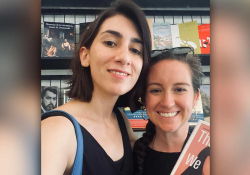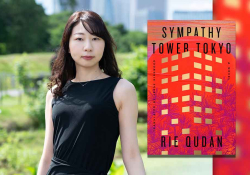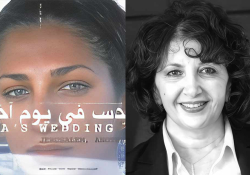The Sounds of Memory in Writing: A Conversation with Ronit Matalon
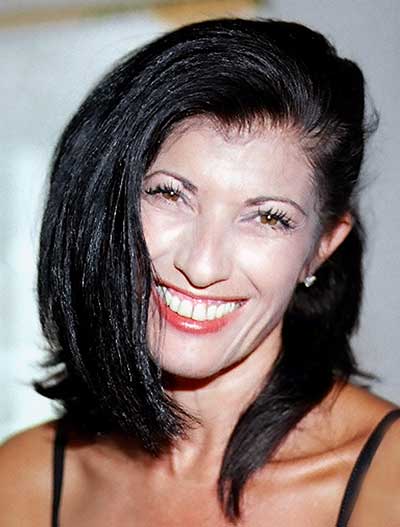
Who is Ronit Matalon? An Israeli fiction writer, essayist, and literary critic, as a journalist she covered Gaza and the West Bank from 1986 to 1993 for the distinguished left-wing newspaper Haaretz. She is currently a professor of comparative literature at the University of Haifa as well as a professor of screenwriting at the Sam Spiegel Institute of Cinema and a member of the Forum for Mediterranean Cultures at the Van Leer Institute in Jerusalem. She has written about the complexity of multiple identities, herself coming from an immigrant family from Egypt. The only child in her family born in Israel to French- and Arabic-speaking parents, she grew up in a poor immigrant neighborhood near Tel Aviv. Her aristocratic, educated father abandoned the family before she was born, not willing to live in Israel as an Oriental (Mizrahi) Jew marginalized by the Ashkenazis who governed the country and dominated its economic and social life then. Her mother, who came from a once-wealthy Cairo family, worked as a cleaning woman for as many as twelve hours a day to provide for her three children and her own mother.
Matalon achieved acclaim in Israel and abroad with her first novel, Zeh ʿim ha-panim elenu (1995; Eng. The One Facing Us, 1998). She embedded in it the rebellious sixteen-year-old character’s observation of her wealthy uncle’s colonial lifestyle in postcolonial Africa with gripping life stories of her exiled family scattered across three continents, by using heirloom photographs as prompts for chapters. Her dissecting eye never relents in its observations of people and their mores. This acuity came from describing, from a very early age, family pictures to her blind grandmother who not only demanded from her descriptions of the tiniest details but also speculations about what the persons’ attitudes could reveal of themselves and their relationships. As a consequence, the young girl developed a natural talent for both observing and embroidering stories on the subjects in the pictures, conferring on her wandering relatives and their various fates an authentic literary status.
Matalon’s next novel, Sarah, Sarah (2000; Eng. Bliss, 2003), is an intriguing narrative constructed through flashbacks. It moves back and forth from Israel to France, where the narrator goes to attend a cousin’s funeral, again weaving the family’s past and present into the failed love story of her best friend, Sarah, a pro-Palestinian Israeli photographer, and her younger Israeli-Arab lover.
Most remarkably, Matalon created a sensation with Kol Tsaʿadenu (2008; Eng. The Sound of Our Steps, forthcoming from Metropolitan Books in fall 2015) and for it received in 2009 the prestigious Bernstein Prize for Best Original Novel. When the novel was translated into French by Rosie Pinhas-Delpuech, herself a writer, in 2012, as Le bruit de nos pas, it stunned French readers too and received the 2013 Prix Alberto-Benveniste. It is a poetic rendering of her childhood memories when living with her single-mother family in a poor immigrant neighborhood after her father abandoned them. Instead of a simple, linear autobiography, Matalon offers readers an impressionistic portrait of each of the family members in numerous short chapters loosely connected by the last word of one to the first word of the next. The result is strange and addictive: what is the next paragraph-chapter going to be? Why are there three chapters on her mother’s hands, two on the rain, four on calligraphy, eight on Piazza San Marco in Venice? Carried along by all the senses, each chapter offers different points of view on the same object, concept, action, character, attitude, imagination, or dream.
The voyage into memories is conducted through the keen eyes and ears of a very young child whom everyone only calls “the child” or, for her mother and grandmother, el bint (Arabic for “the girl”). It starts with the chapter “The Sound of Her Steps,” which actually records no sound but only the anxiety of all the children waiting for their mother’s arrival from her long day’s work, and ends with “The Sound of Our Steps,” in which the family finds unity. While the silent fear of the mother’s violence—unleashed on the objects and inhabitants of their shack if anything is found out of order when she arrives home in the evening—dominates the first chapter, her portrait soon becomes more positive. Lucette, the mother, emerges as an indomitable woman who, like a brave soldier, is battling on all fronts to provide for her children and her mother a home in the shabby non-home that is one of the prefabricated shacks hastily put up for immigrants in the 1950s. Barely more comfortable than the tents on the sands they had been allotted before in the so-called transit camps (Heb. maʿabarot), the shack proves oddly resistant to all Lucette’s attempts to beautify it. As unpredictable as her fits of violence, she will suddenly start moving objects, the furniture, even the walls and the roof, to the dismay of her children and visitors, for this goal.
Her obsession with the idea of a home leads the adult narrator to view the shack as the prolongation of the mother’s desires for a real home, a normal family, and a protective husband. At one point, she even compares the shack to the only husband her mother has had since Maurice abandoned her. “She was the shack never visited by a man; she was the shack becoming a man.” In the arduous job she has to do every day, she has lost all her femininity, which her mother Nonna often reproaches her for, cruelly comparing her own long and aristocratic white hands to her daughter’s swollen, coarse, and manly gray hands. In front of the child, Nonna recalls “the Lucette who stayed in Egypt,” a petite, charming, and delicate woman with rosy-colored cheeks that made people nickname her basboussa (a sweet Oriental cake). What is left of her instead—as she becomes a wordless, aggressive monster who hurls dangerous objects at her terrorized children—is nothing but a “picture of grief.”
One of Matalon’s rare and most impressive descriptions of her mother shows her exhausted from a backbreaking day, sitting on a small stool, sipping her tea before going to bed in a posture of abandonment, a picture of “submission within submission.” While Maurice, the father, criticizes the iniquity of the young state toward its population originating from the Middle East and North Africa as an explanation for his radicalism and idleness, she never complains. Although she seems insensitive to her children, she always sheds a tear when reading La Dame aux Camélias. She seems to have completely obliterated her golden past and only concentrated on the harsh present she has to deal with. In the process, she pays a heavy price, losing her femininity while being the unique breadwinner in the family, doing a job her “gentleman” husband openly despises. He will never lower himself to do menial jobs, except for the few she imposes on him when he wishes to be accepted back in the family. However, as he always fails to complete the tasks, he is invariably expelled out of the home in a matter of hours or days. And this simple woman, educated in the strict codes of conventional Egyptian high society, ironically becomes a fiercely independent woman thanks to his ways. The ever-virile Maurice, an Omar Sharif lookalike who uses his charm to extort everyone, including his wife, is repaid with humiliation for his numerous betrayals. But in spite of her brusque manners, Lucette seems to have always been in love with him, and he in love with her: his last attempt at showing it occurs on her seventieth birthday, when the gift he presents her with is no less than a white, ethereal wedding veil he puts on her head.
With no dates or chronological events, each member of the family is portrayed in impressionistic brushstrokes that span different periods of time, often with contradictory feelings toward them, but no other figure emerges as complex and sophisticated as the child’s father, Maurice. She starts recalling memories of him as young as five or earlier, when her father visits her for the first time on his return to Israel. The only other instance when she met him before was as a toddler with her younger mother, when they both came to meet him in Venice at his request “to see the child.” She was too little to remember, and she tries to reconstruct her memory from the single photograph of the trip, in which the three of them looked like a normal family. Contrary to her preceding novel, The One Facing Us, there is no physical picture, and instead of a single description, the event is revisited seven times with different interpretations expressed by each member of the family at various periods of time.
Maurice’s personality springs from several points of view. His daughter Corinne thinks he “sucked the blood out of the family”; his mother-in-law, Nonna, loves his generosity and his glib talk; his adopted son Sammy tries to include him in all the family events, and the child lives in the expectation of seeing him more often. He dispenses his love in peculiar ways, advising her to read David Copperfield as the best book of all time, and taking her with him to meetings with the charlatans he often deals with for his subsistence. Inserted among the associative chapters linked like pearls of memory are scattered examples of his special writing style, a mix of biblical Hebrew and Communist political jargon. He founded his own party and his own newspaper, of which he is the unique journalist, intended for the Jewish immigrants from Arab countries discriminated by the mainly European-born political elite of the state. His furious ranting against the outcome of the Six-Day War and of how the Israelis put the Egyptians to shame, expressed in the chapter “In His Manner,” manages to get him expelled for the last time from the family shack, not by the mother but by Corinne, who screams he is an Arab and a traitor. With dark humor, he writes that he cannot stand the leaders of the country like Abba Eban, who speaks in Arabic with an English accent, making him think of the British colonizers he hated in Egypt. To the end, the father will stick to his Arab nationalist ideas and his admiration for Gamal Abdel Nasser.
The child narrator records everything around her—images, sounds, conversations, movements—as if she were only eyes and ears. The eerie non-sounds of her mother’s steps in the first chapter, the pounding sound of the occasional rain flooding the roofless kitchen as well as the rest of the shack, “lost into its primal nature of untamed sand,” the sirens and the booms of the 1967 Six-Day War felt in the makeshift trench into which Nonna comes to hide only when it is over, the almost constant hammering of the unending renovations the mother devises in an instant: all are contrasted with moments of heavy silence that get on the mother’s nerves during Sabbath observances. Lucette reads and rereads her French books until she suddenly has to break the silence by digging the sand around the shack to make the blooming garden of roses she ardently dreams of. But even more than the shack, the unfertile soil resists all attempts to be cultivated. Only the Palestinian gardener she has hired encourages her and secretly rescues the paintings of roses she has thrown away in despair of not being near enough to the perfection of the real flowers. When she once goes to visit him in his village in the West Bank, she sees the walls of his shabby house entirely covered with her paintings, to which his numerous daughters have glued sand and leaves in assorted colors.
Memories also can become imaginary visions engulfing dreamlike descriptions of the familia long after the parents have died, prompting even more stories of little moments shared in awe or bliss, and concluding with the family walking side by side in the chapter “The Sound of Our Steps,” united at last “in a scandalous love.”
Perhaps no one expressed the dilemmas of Egyptian Jews better than Jacqueline Kahanoff, a leftist writer who was a friend of both Matalon’s father, the Communist and Arab nationalist, and her uncle Moïse/Moshe, the Zionist. Matalon smartly included in one of her last chapters in The One Facing Us entire passages from Kahanoff’s essay on the quandaries of her generation, the chapter “A Childhood in Egypt” in The Sun Rises in the East:
At school . . . we did not know how it had happened that we Jewish, Greek, Moslem, and Armenian children were sitting together to learn about the French Revolution. As for la patrie, liberté, égalité, fraternité, none of us had experienced such things. . . . They seemed to think it was right for us to want to be like French children, but they must have known . . . that the French did not want us to be their equals or their brothers, that we were in fact nobody at all. . . . The measure of deceit and self-deception was—and still is—characteristic of my Levantine generation. We thought ourselves as Socialists, even Communists. . . . Blithely we dismissed everything that was not left-wing as reactionary. . . . We wanted to break out of the narrow minority framework into which we were born, to strive toward something universal, and we were ashamed of the poverty of what we called “the Arab masses,” ashamed, too, of the advantages a Western education had given us over them. . . . Our parents were pro-British as a matter of business and security, and we were pro-nationalists as a matter of principle. . . . Few of us Jews were Zionists, because we believed that for humanity to be free one had to give up one’s narrow individuality. (Jacqueline Kahanoff, The Sun Rises in the East, 1978)
This shrewd analysis enlightens both the sense of hybrid, Levantine identity of many members of Matalon’s family and the incomprehension between her father and her mother over their respective values.
* * *
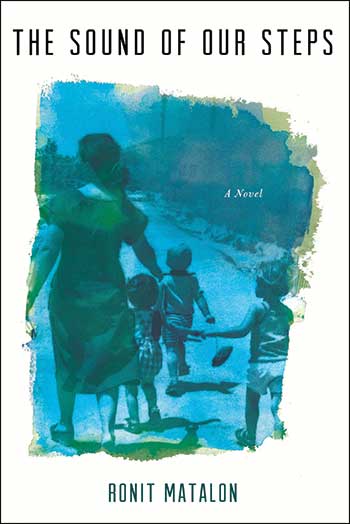 I met Ronit Matalon in early June 2013 at the Assises du Roman in Lyon. Her book had been read by French high-school students before the event, and they commented on it in the local paper. Alerted by her Prix Alberto-Benveniste, I found my way into two meetings in which she participated. One was a forum in which four foreign writers talked about the necessary work of translators, and how good literary translations can powerfully transmit authors’ literary skills to their readers abroad. Matalon talked about her deep respect for translators and their difficult task. I listened to her again the following day at the roundtable with two writers, Christine Angot (France) and Sandro Veronesi (Italy), on the subject of “How to Make Your Characters Talk,” and I asked for an interview, but time was too short, and we agreed it would be more relaxing to do it when I came to Israel for a conference in late July. We met on a hot afternoon in Tel Aviv, in one of these “cool” cafés with funny names, around a piping hot, Moroccan-style mint tea. What follows is the give-and-take of that interview.
I met Ronit Matalon in early June 2013 at the Assises du Roman in Lyon. Her book had been read by French high-school students before the event, and they commented on it in the local paper. Alerted by her Prix Alberto-Benveniste, I found my way into two meetings in which she participated. One was a forum in which four foreign writers talked about the necessary work of translators, and how good literary translations can powerfully transmit authors’ literary skills to their readers abroad. Matalon talked about her deep respect for translators and their difficult task. I listened to her again the following day at the roundtable with two writers, Christine Angot (France) and Sandro Veronesi (Italy), on the subject of “How to Make Your Characters Talk,” and I asked for an interview, but time was too short, and we agreed it would be more relaxing to do it when I came to Israel for a conference in late July. We met on a hot afternoon in Tel Aviv, in one of these “cool” cafés with funny names, around a piping hot, Moroccan-style mint tea. What follows is the give-and-take of that interview.
Dinah Assouline Stillman: When and why did you start writing?
Ronit Matalon: I can tell you precisely when, but I can’t tell you why. When you are a writer, you are not fully aware of what you decide. My father was a kind of writer, not a fiction writer, [but] he had an artistic personality. Because this had been destructive to the family, I was afraid of writing. And I did not consciously want to be a writer. It is complicated, and associated with unhappiness. I don’t know of a single writer who does not complicate his life. . . . I started writing short stories at the age of nineteen, when I was studying literature and philosophy at the university and desired to become a professor in literature, someone who deals with the meaning of the text . . . but I found myself writing short stories for days and nights. Suddenly, I realized I was pretty ambitious about writing stories. Sometimes ambition can be a terrifying thing. If you are afraid you cannot reach your goal, it can destroy you . . .
DAS: Le bruit de nos pas is your seventh novel, the only one translated into French. Why? Were the others translated into other languages?
RM: You are asking me? Ask the publishers in France! I guess my preceding novels were considered too complicated, not commercial enough. . . . A few were translated into English, German, Dutch, Turkish, Italian.
DAS: What is your mother tongue? Arabic, French, Hebrew, Italian? What does each of them represent for you?
Generally, it is the children who teach their immigrant parents their new country’s language. For me, Hebrew became my natural language. I was ashamed of French and Arabic being spoken in my house.
RM: Not Italian. My mother’s language was like a variation of Arabic, French, and Hebrew. She would start speaking in Arabic, and French and Hebrew would follow naturally in the same sentence. Generally, it is the children who teach their immigrant parents their new country’s language. For me, Hebrew became my natural language. I was ashamed of French and Arabic being spoken in my house. But already in my first novel, I felt I had to bring back all these hidden languages in order to hear a voice.
DAS: Is it the first time you bring up your mother as a central figure in your novels? What pushed you to use her as the central character? Could the cause be the dream you describe about her, long dead, refusing to come back and visit the familia? Did it sound like her definitive refusal to come back into your reality?
RM: What a very interesting interpretation about the figure of my mother! I had not thought of that. In my first novel, my mother’s character was not central. I wanted to write about a certain childhood, growing up in the 1960s. Yes, I never wrote as much about my mother before Kol Tsa’adenu. I think writing about my mother changed my style of writing, my image of the world. I felt I wrote this book differently than my other books before.
DAS: I found it interesting that you almost never physically described your mother except for her rough hands inherited from her hard cleaning jobs, night and day.
RM: Her physical features are fragmented throughout the book. It has to do with my writing process for this particular novel. I was only preoccupied with my memories. I tried to be a very faithful listener to my memories. That is why the novel is so fragmented.
DAS: The readers perceive her by her sudden and violent actions, throwing objects that, in her eyes, are no longer useful, or moving all the furniture around, and by your sister Corinne’s words: “She drives words into people as if they were nails.”
RM: There was something very unpredictable about this woman, which caused anxiety all around her. On the other hand, she was the only reliable person in my entire world.
In this book, I wanted to rehabilitate my mother’s contradictions, her complexity. Because we live in clichés: something really terrible happened to our human souls.
DAS: And yet, in spite of her control over all the inhabitants of the baraque (a “shack,” which is what she would call the poor lodging the family lived in) and the fear her approaching footsteps created in each of the family members were she to find the house not tidy enough, there is no doubt for the reader your mother was the one and only pillar of the family.
RM: Yes, without her, there would be no family. In this book, I wanted to rehabilitate her contradictions, her complexity. Because we live in clichés: something really terrible happened to our human souls. That is why it is difficult nowadays to grasp Dostoevsky in his complexity. You cannot understand complexity when you have to live with it.
DAS: Do you admire your mother? In your opinion, did she sacrifice herself to nourish and keep together your fatherless family?
RM: I don’t feel that I admire her, because part of admiration is blindness, and I don’t think I am blind to her tough side. Did she sacrifice herself? That is a difficult question. . . . What is the meaning of self-sacrifice? I think there are many answers. First, it is about surviving; second, it is about her capacity of love and devotion to her family; and finally, there is a sort of religious aspect to that devotion.
DAS: Although she is so tough, on herself and on others, there is a sort of femininity, the frailty of a single woman that is revealed through her constant reading and rereading of La Dame aux Camélias, or when Maurice, your father, attempts to conquer her again a number of times.
RM: She grew up in Egypt, in the upper class, by the romantic standards of the “good girl” in the nineteenth century. But it was not just her upbringing; she also was something of a feminist. Her feeling of independence instinctively made her overcome this romantic side, especially in front of my father.
DAS: Your father seems to have been a mixture of a gentleman and a bum. Were you proud of him when you were a young child? What about now?
RM: I generally felt both embarrassed and proud, and sometimes I don’t know how I felt. . . . He was another complicated personality, with his mixture of charm and immorality. But for me he offered a very important lesson, because the people who speak of morality are not necessarily the ones who are the most moral. . . .
DAS: When you quote his notes, in which he justifies his actions—or the lack of them—by his political or social views, which aspect of him do you wish to focus on?
RM: First of all, I wanted to bring in his language, the way he wrote, the way he thought, his strange Hebrew. In his writings, albeit pervaded with a kind of pathos, he was able to discern the most important features of Israeli society. They contained a strange combination of brilliant vision and pathetic comments.
DAS: What do you think of his political views, as a self-proclaimed, die-hard Communist? Did they influence you in your former career as a journalist, working not for just any newspaper in Israel but the prestigious Haaretz, which is known as leftist? Did you embrace it to join your father in his views, or to emulate him?
RM: I think I had my own way. Surely, he was a great influence, but I really desired to build my own opinion. We had different ways. I had my own views, some of them were pretty close to his, but the meaning and the context were different. His views on identity were really complicated. I wrote essays about it, rather than journalistic pieces.
DAS: For my part, I can feel your ambiguous love for your parents in almost every line I read . . .
RM: I don’t know if my love is ambiguous, but my interpretation may be: what kind of people my parents were. The main thing is to see them not as my parents but as human beings. I think my book is full of love. If it is the truth you want, the question for me is, Do you love your parents as human beings, in spite of their failures? My father was a terrible father, but I loved him as a human being. I have great respect for my parents. What they did was what they could do best. They were lonely people, and they both chose to be lonely. It is their independent personality that makes me respect them.
DAS: Your novel is far from being a traditional novel with a central, imaginary plot. It is composed of a multitude of anecdotes and vignettes, fragmented like the memories you are drawing from. Did you wish to express precise bits of memories, or rather to add to them a dreamlike dimension, thus giving to your family members a more novelistic aspect?
RM: That’s right. For them life itself was so big, so full of color, tragedy, and absurdity. I don’t consider this book my autobiography; there is that novelistic dimension. When I evoke Maurice, he is a character that one could recognize when seeing another person of that age and background; one could say, “This man looks like Maurice!”
DAS: Of yourself as a child, you don’t say anything, or very little. You seem to be just there to watch everything around you, the people, the objects, the concepts, the unique picture of you and your parents, all at different time periods and from different angles, so much so that readers may be confused. Did you wish to convey the idea that there is no single point of view, no single truth for each of the moments you lived, but rather a multiplication of viewpoints and truths for each of them?
RM: Yes. That is exactly what I wanted to show, this variety of points of view. We don’t have the same visions of our parents, or of life as our parents. I wanted to show this diversity of viewpoints about our stories, of the child as a person and as a grown-up.
DAS: In your memories in this novel, it strikes me that you almost never mention school. Do you mean it was not important in your life then, or that what happened in the baraque was more important to you?
RM: It was not a book about me, or maybe deep, deep inside “a portrait of the writer” as a very, very young person. It was more about my prime memories. I wasn’t concerned with socialization then, but with witnessing. I could say my first ambition for this book was to be a witness.
I wasn’t concerned with socialization then, but with witnessing. I could say my first ambition for this book was to be a witness.
DAS: A last question: What do you think you have inherited from your parents, your family, your multiple identities? What was most influential on you in the transmission of their cultures and the building of your personality?
RM: I wrote a whole novel about this question! Four hundred pages of this novel try to address this very heavy question. . . . I am fascinated by the culture my parents grew up in, because I think this cultural heritage is universal. The moral values were really universal. They were citizens of the world. They spoke at least four languages. They did not talk about Jews and Arabs. They were part of that culture, and they knew about the relativity of that culture. The Other is something that is other than you, that’s all. Their world ended with nationalism and Nasser. It cannot exist anymore.
August 2013
Translation from the French
By Dinah Assouline Stillman


